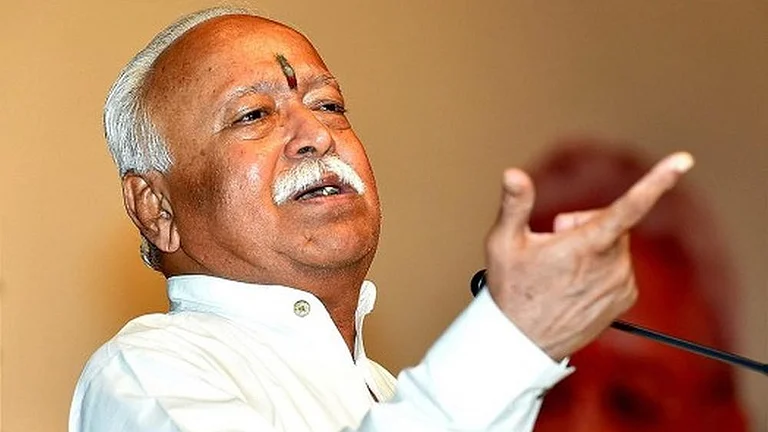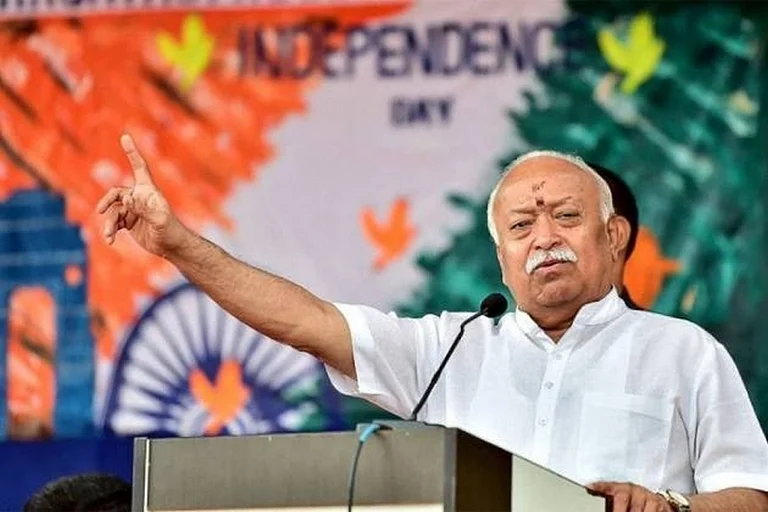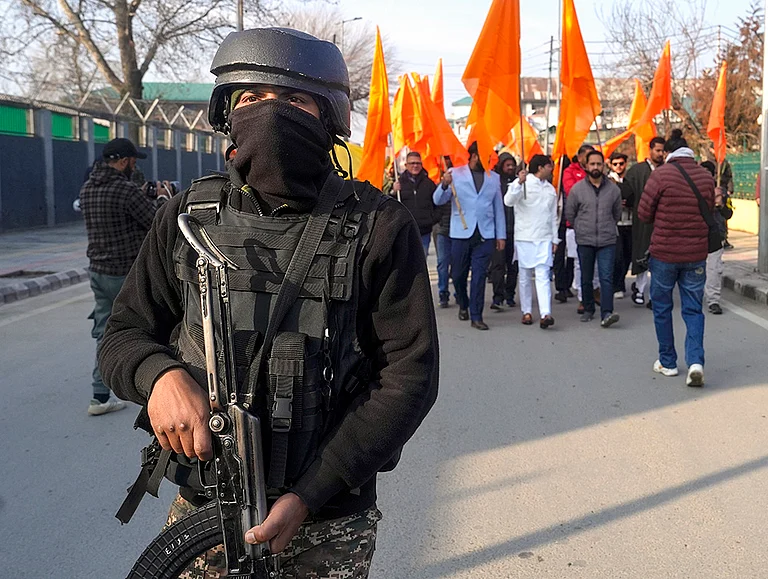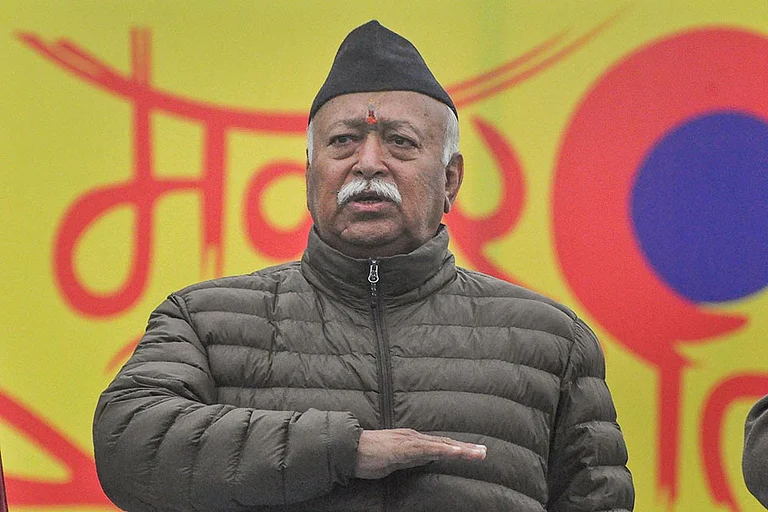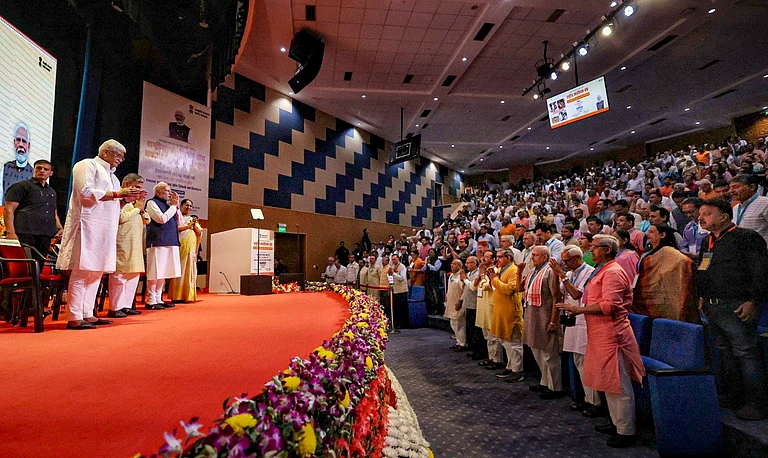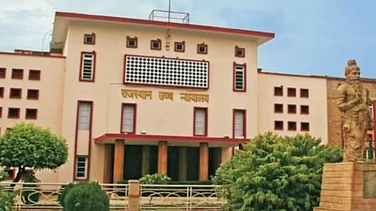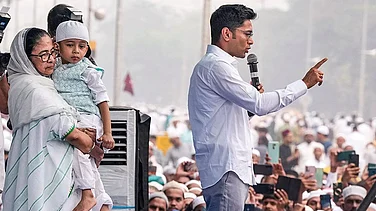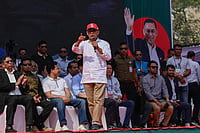
Over 50,000 swayamsevaks gathered at Reshimbagh, joined by Bhagwat, Kovind, Gadkari, Fadnavis, and global diplomats; the Shastra Puja showcased traditional and modern arms, symbolizing a vigilant, self-reliant Bharat.
Kovind linked RSS values to Gandhi, Shastri, and Ambedkar, dispelling misconceptions, promoting the Panch Parivartan initiative, and urging youth to shape politics for a united Bharat by 2047.
Bhagwat addressed security (Pahalgam, Naxalism), economic self-reliance amidst global challenges, Himalayan conservation, and the RSS’s focus on character-building through shakhas, advocating a holistic development model.
Reshimbagh ground in Nagpur wore its century of saffron on its sleeve on Thursday as the Rashtriya Swayamsevak Sangh (RSS) hosted its Vijayadashami utsav, on yet another landmark year on its home turf.
Founded on the same day in 1925 by Keshav Baliram Hedgewar, the Sangh marked the occasion with its annual gathering at the site of its first shakha (an RSS branch office). The ground was lined with saffron banners and filled with rows of swayamsevaks (volunteers) in uniform, with an attendance estimated at over 50,000. On stage were RSS chief Mohan Bhagwat and former President of India Ram Nath Kovind as chief guest. Along with them Union minister Nitin Gadkari, Chief Minister Devendra Fadnavis, both mahrahtrian clad in RSS uniform. Saints and diplomats from the US, UK, Australia, Ghana and South Africa on either side of the main stage.
The programme began at 7.40 am under a shamiana set with banners. Kovind and Bhagwat performed the shastra puja, the ceremonial worship of arms, before an array that included swords and shields alongside replicas of Pinaka rocket launchers, mock-ups of their upgraded versions and surveillance drones. The rituals, conducted to vedic chants and bells, were followed by synchronised lathi drills by the swayamsevaks. Kovind later laid a wreath at Hedgewar’s samadhi before addressing the gathering. He described the RSS as a banyan tree that offered pride and shelter to the people of Bharat and recalled Mahatma Gandhi’s visit to a shakha in 1934 and Ambedkar’s observations on caste and equality, urging young people to enter politics if they wished to shape the future.
Kovind paid homage to Gandhi and Lal Bahadur Shastri, linking their legacies of non-violence and service to the ethos of the RSS. “On this Vijayadashami, we bow to the architects of our freedom,” he said. Likening the RSS to “a sacred, sprawling banyan tree that brings together the people of Bharat, providing them with pride and the rejuvenation of glory and progress,” he called for misconceptions about the organisation to be dispelled.

Kovind cited Gandhi’s 1934 visit to a shakha, where the Mahatma had praised the organisation’s discipline and the absence of caste barriers. “Mahatma Gandhi was also highly impressed by the practice of harmony, equality and complete absence of caste-based discrimination in the working of the Sangh,” he said. The former President also referred to Ambedkar’s observations in 1935 and 1939 on the eradication of untouchability. “The concerns and thought process of Dr Ambedkar had been the same as that of RSS,” Kovind said, adding, “Ambedkar’s ideas gave him strength, and Hedgewar’s life gave him direction.” Quoting Ambedkar from a 1940 visit to an RSS branch in Karad, as reported in the Kesari newspaper, he said: “Despite differences on some issues, I look towards this Sangh with a sense of belonging.”
Kovind credited Hedgewar and later leaders like Golwalkar, Deoras, Rajju Bhaiya and Sudarshan for shaping the organisation, and cited Vajpayee’s remark that “We are not followers of Manu Smriti but Bheem Smriti, that is, the Constitution of Bharat.” He praised the Sangh’s resilience through bans in 1948, 1975 and 1992, saying, “The Sangh has no formal membership, yet no one can match the dedication of its swayamsevaks.” He spoke of the Panch Parivartan initiative, focused on social harmony, family values, environmental stewardship, self-awareness and Swadeshi discipline. He urged recitation of the Ekatmata Stotra as “the testament of the inclusive vision of RSS,” which names Valmiki, Ekalavya, Sant Ravidas and Ambedkar. Lamenting the retreat of “good people” from politics, Kovind asked young citizens to step forward. Quoting the English proverb “United we stand, divided we fall, that is, where there is unity, there is identity. Where there is division, there is decline,” he urged unity. By 2047, he said, he imagined a developed and harmonious Bharat. “We are Indians before, Indians after, and Indians in the end. Long live Mother India.”
As applause thundered and lathis were raised in salute, the stage passed to Mohan Bhagwat, whose hour-long address surveyed achievements and concerns. Extending Vijayadashami greetings, he marked the 350th anniversary of Guru Teg Bahadur’s martyrdom, calling him the “Shield of India” for resisting tyranny. Gandhi and Shastri were also remembered on their birth anniversaries. Gandhi, he said, had been central to the freedom movement and had imagined a society based on Bharat’s selfhood. Shastri was described as an example of humility and service.
Bhagwat referred to the terror attack in Pahalgam in which 26 pilgrims were killed, praising the government and armed forces for their response in Operation Sindoor. He welcomed the decline of Naxal movements, crediting firm state action and disillusionment among people, but warned that peace would last only with justice, development and trust. Turning to the economy, he acknowledged growth but criticised global systems for concentrating wealth and damaging the environment. He cited new US tariff policies under Donald Trump, saying, “The new tariff policy implemented by the US was done keeping in mind the interest of their own. But everyone is affected by them. The world functions with dependence on each other; this is how relations between any two nations are maintained. No country can survive in isolation.” He repeated the call for Atmanirbhar Bharat, stressing Swadeshi production alongside cooperation that did not compromise national autonomy. “This dependence must not turn into compulsion. We need to rely on swadeshi and focus on self-reliance. Yet strive to maintain diplomatic relations with all our friendly nations, which will be with our wish and without compulsion.”
He argued that Western development models were incomplete as they ignored ethics, culture and ecology. Returning to the Sangh’s founding principle, he said social change began with individual conduct. “The RSS’s core mission is to create individuals of character who, through their conduct, inspire societal change.” Shakhas, he said, were the foundation of discipline and community life. He stressed the RSS had kept out of politics for a century to focus on character building, and vowed to expand daily shakhas during the centenary year. “Millions of volunteers know 'Namaste Sada Vatsalye Matribhoomi'. Still, I would like to repeat this line that the country gives us everything. We should also learn to give something.”
As the sun rose, chants of “Bharat Mata ki Jai” rang across the ground. The meeting ended with a route march through Nagpur, before swayamsevaks dispersed quietly to their neighbourhoods on buses and scooters.








